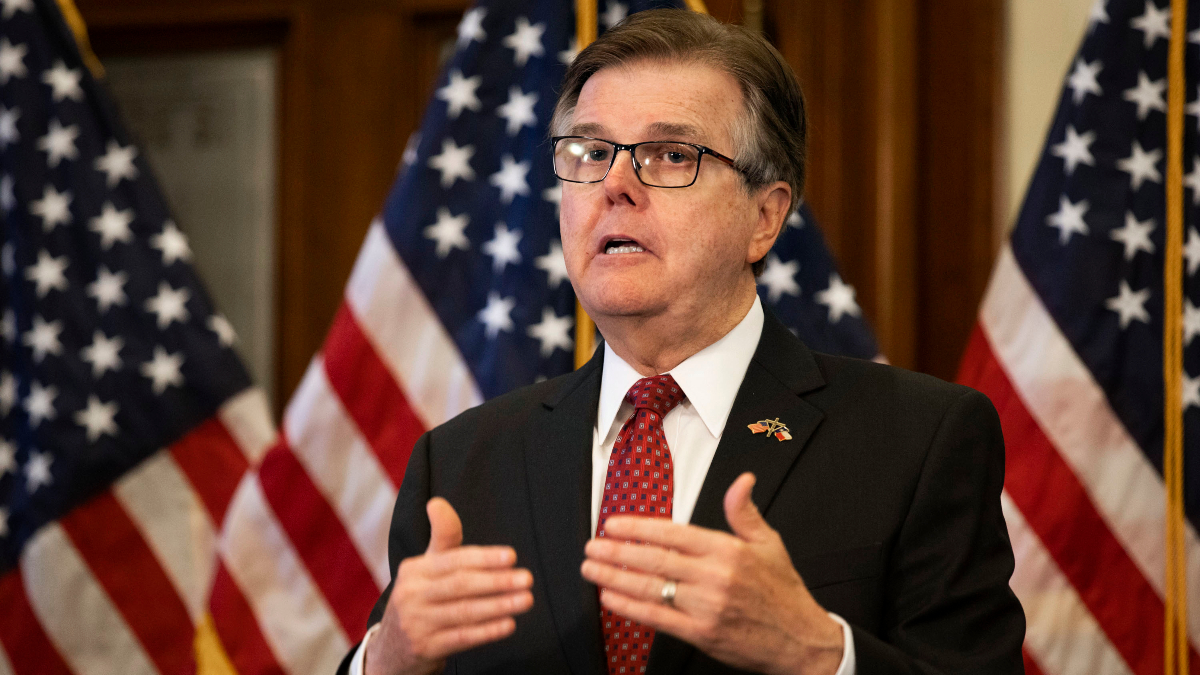Newest Texas Sports Betting Legislation Still Faces Uphill Climb
Lynda M. Gonzalez – The Dallas Morning News Pool/Getty Images. Pictured: Texas Lt. Gov. Dan Patrick.
The latest Texas sports betting bill has support from state sports teams, top sportsbooks and a bipartisan group of lawmakers. It probably won’t overcome opposition from the state's most powerful elected officials.
A bill introduced Tuesday that would allow Texas professional sports teams sports betting licenses joined several other proposals to expand the state’s gaming options for the first time in decades. Like the other bills, the newest legislation is likely to die before a full floor vote — if it even gets that far.
Background on Texas Gaming
The birthplace of Texas Hold ‘em has not been kind to legal gambling.
Texas legalized pari-mutuel horse racing long after most other states had done so and, with the notable exception of the state lottery in the early 1990’s, has not accepted any major new expansion since. Aside from a few horse tracks, which like most of the rest of the country are suffering declining attendance and revenues, there are only a couple Native American casinos, all of which are far removed from the state’s major population centers.
Not coincidently, conservative, anti-gambling Republicans have dominated Texas politics for decades. Though casino or other gaming bills pop up in the statehouse with nearly every biennial legislative session, none have gained much serious traction.
As nationwide gambling attitudes have shifted – and casinos popped up on Texas’ borders with Oklahoma and Louisiana, gaming supporters had hoped top policymakers’ views may evolve as well. Republican insiders believe Gov. Greg Abbott, who initially opposed any new gaming bill when taking office in 2015, could be warming to legal sports betting.
The lieutenant governor is not.
Unlike most other states where the lieutenant governor is a largely symbolic position, Texas gives the office substantial tangible and intangible power over the state Senate. As presiding officer, the lieutenant governor can refuse to bring bills for a full floor vote, regardless of its support, giving him or her the de facto power to kill virtually any legislation.
Incumbent Lt. Gov. Dan Patrick indicated he may use that power to kill sports betting. In a recent radio interview, Patrick said sports betting "wouldn't see the light of day." Though he commented before the latest Senate bill was introduced Tuesday, it appears Patrick, a staunch conservative and a frequent guest of Republican-friendly media, will block any new gaming measure.
Advocates Try Their Shot
Despite the political obstacles, Texas remains arguably the biggest prize in the gaming industry.
The late Sands Las Vegas CEO Sheldon Adelson hired several dozen high-profile Texas lobbyists ahead of the 2021 session to support casino legislation. Investment by one of the world’s richest men and most prominent casino operators reignited possibilities that a casino in the fast-growing Dallas, Houston and San Antonio metro areas was possible.
Meanwhile, the Sports Betting Alliance, a coalition of Texas sports teams and national sportsbook operators, is pushing legal wagering legislation, including through the bills introduced earlier this week.
Made up of more than a dozen high-profile teams such as the Dallas Cowboys, Houston Astros and San Antonio Spurs as well as sportsbook operators such as DraftKings, FanDuel and BetMGM, the alliance argues Texans should have the right to vote on legal wagering in their state.
If passed, the latest sports betting bill would place a wagering authorization referendum on the 2022 ballot. Getting there does not appear easy.
Next Steps
Like several other casino and sports betting legalization bills introduced earlier this year, the new, bicameral sports wagering legislation sponsored by Democratic Sen. Juan Hinojosa and Republican House Rep. Dan Huberty has not yet been assigned to a committee. With only 14 weeks left in the 2021 session (and no regular session scheduled until 2023) there’s not much time remaining for action.
Should the bills, which are competing for time and political oxygen with hundreds of other bills as well as the state’s response to recent winter storms, reach the floor, it will still have to overcome antagonistic leadership – especially in Patrick’s Senate.
Though there has been more positive momentum for legal Texas gaming in 2021 than in most other recent years, it seems increasingly unlikely any substantial bill passes into law this year.
Gaming backers will likely be left to hope these tiny steps forward, combined with increased stakeholder advocacy and shifting public attitudes, can spur meaningful action in the years to come.
How would you rate this article?


